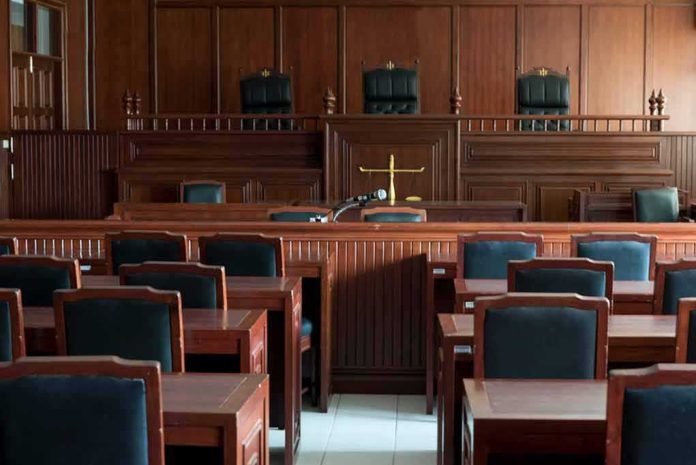
Two Florida attorneys have been suspended after making unfounded racial bias accusations against a judge, causing such severe backlash that the judge received death threats requiring enhanced security measures.
Key Takeaways
- The Florida Supreme Court suspended attorneys Jerry and Brooke Girley for 30 days after they made unfounded racial bias accusations against Judge Kevin Weiss
- The attorneys represented a Kenyan doctor in a discrimination case where a jury awarded $2.75 million, but Judge Weiss later directed a verdict in favor of the defendant
- The Girleys’ public statements on social media and in interviews led to harassment and death threats against the judge
- The court ruled their statements violated Florida Bar rules as they were knowingly or recklessly false claims about a judge
- The suspension emphasizes the legal requirement for attorneys to maintain professional conduct even when disagreeing with judicial decisions
Race Card Backfires: Attorneys Face Consequences for Unfounded Accusations
The Florida Supreme Court has delivered a strong message about professional responsibility by suspending attorneys Jerry and Brooke Girley for 30 days. The husband-and-wife legal team faced disciplinary action after making public accusations of racial bias against Judge Kevin Weiss, who presided over their client’s discrimination lawsuit. The Girleys represented Baiywo Rop, a Kenyan doctor who sued Adventist Health System claiming wrongful termination due to racial discrimination. While a jury initially awarded their client $2.75 million, Judge Weiss later directed a verdict favoring the health system, effectively overturning the jury’s decision.
“Today in Orlando, Florida, a white Judge stole justice from a black doctor. After being awarded by a jury $2.75 million for discrimination, a judge reversed their verdict. We need help getting this out,” said Brian Girley
Rather than pursuing proper legal channels to challenge the judge’s ruling, the Girleys took to social media and gave interviews alleging racial bias. Brooke Girley posted inflammatory content suggesting systemic racism in the judiciary, including a particularly incendiary quote: “A black man has no rights which a white man is bound to respect.” These actions violated Rule 4-8.2(a) of the Florida Bar, which prohibits lawyers from making false statements concerning the qualifications or integrity of judges. The court found their claims lacked any factual foundation and were either knowingly false or made with reckless disregard for the truth.
Social Media Firestorm Leads to Serious Consequences
The Girleys’ public campaign against Judge Weiss had dangerous real-world consequences. Their inflammatory rhetoric and unfounded accusations of racism incited a wave of harassment directed at the judge, including death threats that necessitated additional security measures. The Florida Supreme Court emphasized this point in its ruling, noting that the attorneys’ irresponsible public statements directly endangered a member of the judiciary. This dangerous outcome factored into the court’s decision to impose a suspension rather than a mere reprimand, highlighting the serious nature of their professional misconduct.
“The $2.75 million that was taken by the stroke of a judge’s pen, that was a theft, a theft to the community,” said Jerry Girley
In their defense, the Girleys raised due process claims and argued that their statements were protected speech. However, the court firmly rejected these arguments, emphasizing that attorneys are held to higher standards than ordinary citizens when commenting on judicial proceedings. The court found that the Girleys’ statements targeted specific judicial members and were prejudicial to the administration of justice. While disagreement with judicial decisions is permitted, attorneys must express such disagreement through proper legal channels rather than launching public smear campaigns based on unfounded allegations of bias.
Upholding Standards in the Legal Profession
This case serves as a powerful reminder that attorneys must uphold the integrity of the legal system even when they disagree with judicial outcomes. The Florida Supreme Court’s ruling reinforces the principle that lawyers cannot use inflammatory racial allegations as a weapon against judges who rule against their clients. The 30-day suspension sends a clear message that such behavior undermines public confidence in the judiciary and violates the oath attorneys take when admitted to the Florida Bar. This disciplinary action demonstrates the court’s commitment to maintaining professional standards and protecting the judiciary from unfounded attacks that can lead to dangerous consequences.
While the Girleys claimed to be advocating for justice, their methods crossed professional boundaries and ultimately harmed their standing in the legal community. The case highlights a growing trend of individuals weaponizing accusations of racism without supporting evidence. In this instance, Florida’s highest court has shown that such serious allegations require substantiation, particularly when made by officers of the court who have ethical obligations to uphold the integrity of the legal system. This ruling reaffirms that all attorneys, regardless of their clients’ cases or personal beliefs, must adhere to professional standards of conduct.



